Patrick Carlyon: Our great city is finally waking from its slumber
On the last day of one of the longest lockdowns in the world, the beep of reversing vans and trucks heralded pivotal change. But as the city wakes from a deep slumber, business are left to ponder if our iconic CBD has irretrievably changed for the worst.
John Davie was waiting for his beer at 6.30am yesterday.
The delivery was his first for months. In the haze of winter lockdown, Davie was forced to pour more than 1000 litres of beer down the drain.
Yesterday, the publican was glad to pose for photos of exuberance and jubilation. At last, his Charles Dickens Tavern would re-open — kind of.
Davie was up until 2am the previous night, fielding bookings. Most missed out. He is restricted to 20 patrons, 10 in two rooms, in a business model that cannot survive.
Those numbers are less than 10 per cent of the pub’s capacity on the late nights when hundreds used to rush the Collins St venue for its live coverage of English soccer matches. Even in June, when Davie briefly opened between virus waves, he could host 30 people.
But something, he said, was better than nothing. He greeted Monday’s announcement with high-fives from his kids. If Davie has missed many major soccer fixtures, at least he will be pouring beer from a tap for this weekend’s Bledisloe Cup.
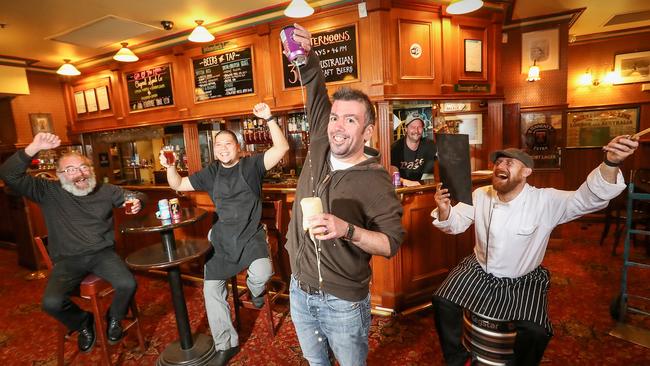
“I don’t think 40 customers is sustainable for business,” he said of plans to double the allowed patronage after November 8.
But he felt lucky. He and his co-owner had no debt. “You put it away for a rainy day,” he said. “ And this has been torrential.”
The first tentative signs of a wider awakening showed yesterday. Warrigal Rd was the kind of bottleneck it was in that other world, pre-COVID, when parents dropped their kids at school and went to work.
The front page of the Herald Sun proclaimed “FREEDOM” and talkback radio was similarly upbeat, dominated by people’s plans to have barbecues, see mates, and catch up with loved ones.
Today’s scheduled retail opening was being compared with the craziness of Boxing Day sales. Kmart, open since midnight, set up a booking system — to use a cash register.
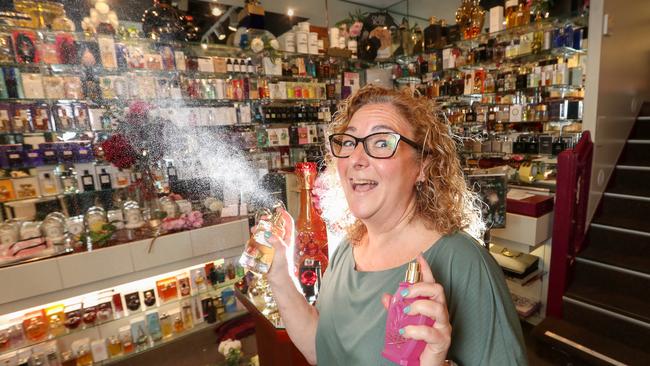
In the CBD, on the last day of one of the longest lockdowns in the world, the beep of reversing vans and trucks heralded pivotal change. Trolleys scooted and drills whined. Empty trams and laneways still conflicted with the postcard images. Police officers remained a constant, if muted, presence.
Business owners spoke of the pain that was — and the pain ahead. They wondered if the city was in flux or irretrievably changed.
Where would the customers come from? This was the question from Abbie Siegel, whose family has run the Paint ’n Powder perfumery for 53 years.
She feared that the damage of lockdown was irreparable. She described a doughnut effect. Shoppers would rush suburban shopping behemoths, such as Chadstone. But why would they visit the city’s heart, given an absence of tourists, workers or students?
Her shop is in the Royal Arcade, Melbourne’s oldest, where six tenants, or more than one in five, had “upped and out” since the pandemic began.
As her staff arranged floral displays, Siegel pondered the impost of rent in a period of no revenue, when government handouts amounted to about an eighth of the (reduced) payments.
Her business was denied the usual rush at Easter, Mother’s Day and the Spring Carnival. Christmas business awaited, but how could it emulate the turnover of a pre-virus world?
“I’d like to say it’s going to be fantastic, but I don’t think it will be,” she said. “I’m glad my mother isn’t around to see this.”
Up Bourke St, restaurateur Guy Grossi was more chipper. The familiar face greeted passers-by as his staff unfolded white tablecloths, sanitised dining areas, prepared the kitchen and received deliveries.
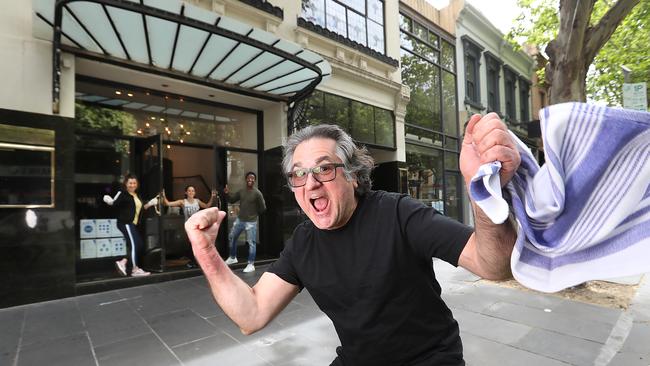
He was “relieved” by Monday’s announcement, but also spoke of the “soul-destroying” time in limbo. His takeaway business had thrived, he said, but he itched to return to his restaurant of two decades.
“We’re taking a step,” he said. “It’s not the finish line but we have started the race.”
Grossi voiced concerns that many Victorians have about the state’s contact tracing capabilities. A “bit of hope”, and “lots of energy” must be built on efficient health responses for the inevitable outbreaks ahead.
As river restaurants waited for deliveries of furniture, and took four weeks of bookings in 24 hours, they spoke of having a full capacity reduced to 7 per cent of pre-COVID figures (or almost one-fifteenth).
What’s worse than a reduced opening, which one business owner said was almost as challenging as being closed, would be a return to lockdown.
This appears to be a universal fear in retail circles, an assumption that pre-COVID life cannot resume until a vaccine is found. And no one knows when — or even if — that will be.
Some service providers say they are already doomed. The taxi industry is almost non-existent. The airport’s long-term carpark has a few dozen cars, as opposed to the usual tens of thousands.
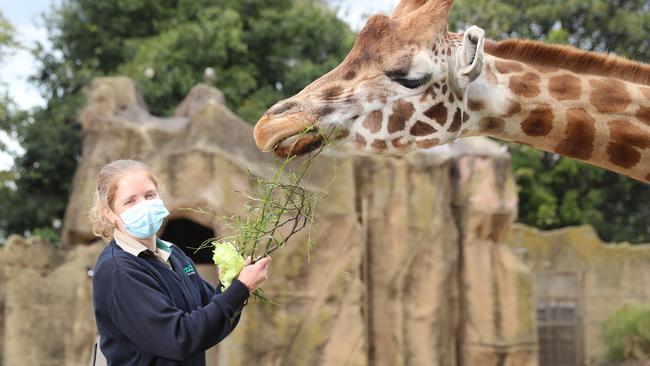
Lou “The Cabbie” Bougias has become an unwitting emblem of Melbourne’s sadder moments. He helped the victims of the Bourke St tragedy in 2017. He was on the scene when a truck killed four police officers on the Eastern Freeway in April.
Bougias hasn’t been to the city in months. His only fares have been elderly customers going to the shops or medical appointments. The world has shifted, he said, and drivers have been left behind.
Corporations planned to reduce their office workforces. “They’ve all discovered Zoom, and worked out that that’s a lot cheaper than sending people interstate, which costs thousands of dollars,” he said.
“We’re all done, which is sad. Our once great city is gone. I have to find another job.”
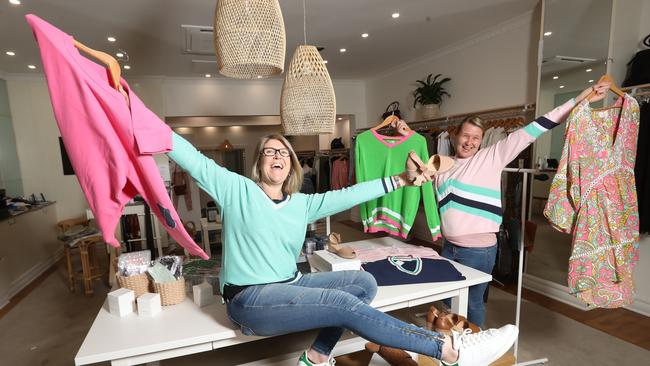
North of the city, one of the few venues normally open every day of the year, the Melbourne Zoo, was yesterday preparing for a Thursday opening. Zuberi the lion, lounged on a perch above a silent kingdom.
For its return, the zoo has marketed an immersion in nature as a healthy way to build resilience and wellbeing. But it hardly needs to.
Sometimes brimming with up to 12,000 visitors a day, the zoo will be restricted to 2500. Zookeepers wonder how some animals, in the dearth of human contact, will handle the relative rush of people who have had to book — and provide contact details — to get in.
In adversity, there are always stories of opportunity. Such as Ainsley Sinicco, who saw a “for lease” sign and pursued her dream of opening a clothes shop.
Fresh from homeschooling five children, she hoped for a “positive out of the negative”, and cannot imagine a better time to start a business.
Her Stanley & Stone shop in North Balwyn has its grand opening on Wednesday. She believes some women have tired of shopping online, and would avoid major shopping centres for fear of infection.
“I’m thinking retail strips will have a bit of a comeback,” she said. “The shop is the brainchild of COVID. I didn’t have the guts

